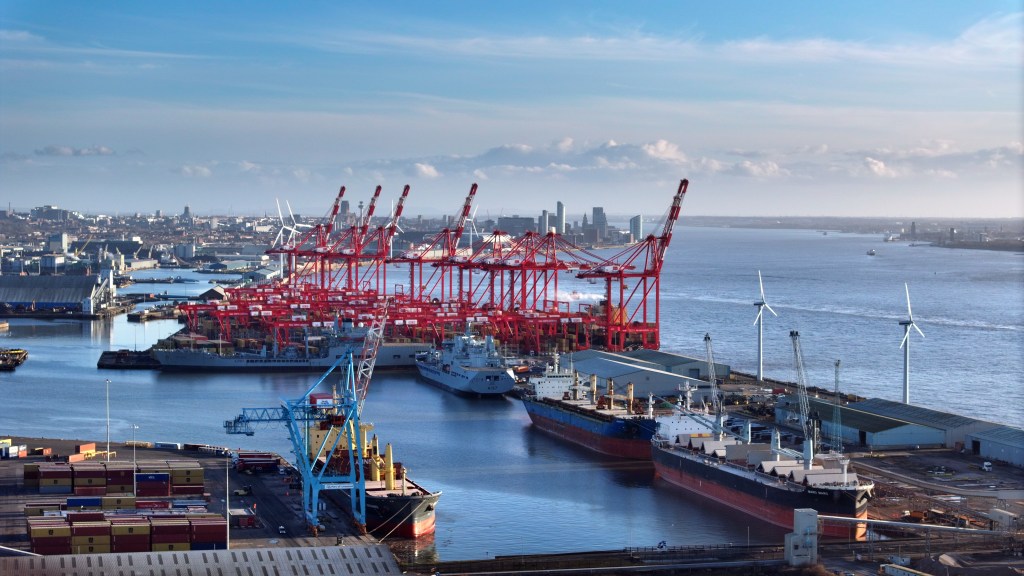The United Kingdom is shoring up the funds to go alongside its net zero efforts.
The country’s government announced Monday that it had allocated £448 million ($611.6 million) toward decarbonizing shipping through its UK Shipping Office for Reducing Emissions (UK SHORE), which was developed in 2022.
The timing of the funding announcement aligns with London International Shipping Week (LISW), and private industry added £700 million ($955.6 million) to the initiative.
The government said it will use the money to strengthen the UK SHORE initiative, which will include further research on and development of clean fuel and clean technology, including renewables.
The £700 million in private sector funding comes from Peel Ports, NatPower Marine and the Port of Tyne. Peel Ports has earmarked £300 million ($409.5 million) for ports in Liverpool, England; Great Yarmouth, England and Hunterston, Scotland.
NatPower Marine, which works on the electrification of ships, has promised £250 million ($341.3 million) over the next five years for adding more shoreside power—which provides ships the ability to turn off their engines while docked or at berth. The UK government said the project would likely see 2,000 jobs created. Stefano D.M. Sommadossi, CEO of NatPower Marine, said it has a vested interest in seeing a greener UK.
“This investment is more than just ports and cables—it’s about people and prosperity. The overall program is expected to create over 2,000 skilled jobs, particularly within local port communities. These are real jobs with long-term benefits, embedded in regions that need investment the most. We stand ready to work closely with government to accelerate this innovation in maritime energy transition even further,” Sommadossi said in a statement.
The Port of Tyne plans to invest £150 million in a clean energy development site that the government projects could see the creation of as many as 12,000 jobs in offshore wind and manufacturing roles. CEO Matt Beeton called the construction site “nationally strategic” and said that it’s slated to “enable the creation of world-class infrastructure to support a growing supply chain offering.”
Member of Parliament (MP) and Transport Secretary Heidi Alexander said the government welcomes the support from the private sector and will continue to prioritize its net zero goals ahead of 2050.
“[This] £1.1 billion boost for the maritime industry will supercharge growth and jobs in our coastal towns and cities—making the UK one of the best places in the world to invest,” Alexander said in a statement. “We’re committing almost half a billion to cut carbon emissions from shipping—steering us towards net zero by 2050 and cementing Britain’s place as a clean energy superpower through our Plan for Change.”
To date, the government has already distributed £240 million ($327.6 million), allocated to more than 200 projects. It attributed 750 jobs to those endeavors. MPs boasted a £3.6 million ($4.9 million) project in Liverpool project that drew a private investment match meant to support a shore-power system similar to the ones NatPower Marine has planned. They also counted a £3.3 million ($4.5 million) partnership with Scotland’s FastRig, which makes retractable sails retrofitted with sensors to leverage wind power over engine power, as a success.
Newly appointed Parliamentary Under-Secretary of State for Transport, Keir Mather, wrote to Parliament Monday to let other MPs know of the Department for Transport’s specific plans for the new funds.
Mather said that, in line with the UK’s maritime decarbonization strategy (MDS), UK SHORE will use the private and public funds to host another round of the Zero Emission Vessels and Infrastructure competition (ZEVI2) in 2026; “support early scientific research of novel technologies through the ongoing work of the Clean Maritime Research Hub until at least 2028;” allow for international research and development on clean power for maritime and more.
Mather said that kind of innovative spirit—bolstered by support from the government itself—could attract further investment to the country, which would give the UK a leg up in the broader shipping industry.
“Through supporting UK businesses to accelerate technologies through to market readiness, UK SHORE will advance competitive advantage in clean maritime solutions while complementing wider UK strengths in R&D like automotive, battery systems and hydrogen propulsion,” Mather told Parliament members. “The work to scale-up UK technologies and penetrate international markets will strengthen the UK supply chain, increase exports and bolster international leadership.”

